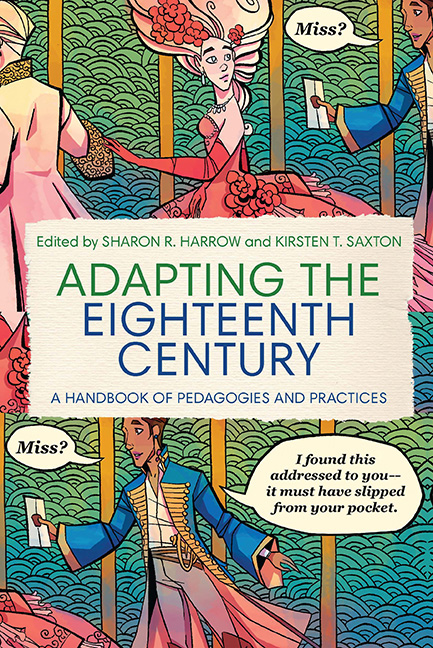Book contents
- Frontmatter
- Dedication
- Contents
- Acknowledgments
- Introduction
- 1 “Je suis Voltaire,” or, Appropriating the Philosophe in the Social Media Age
- 2 “Who Lives, Who Dies, Who Tells Your Story?”: The Uses of Hamilton in Special Collections Pedagogy and Public Engagement
- 3 Performing Frankenstein in the South: Sex, Race, and Science across the Disciplines
- 4 French Fairy Tales and Adaptations in the Twenty-First-Century Classroom
- 5 Select Trials at the Sessions-House in the Old-Bailey (1742) and Mark Ravenhill’s Mother Clap’s Molly House (2001)
- 6 Teaching with The Pilgrim’s Progress Video Game
- 7 Eliza Haywood’s “Bad Habits”: Teaching Adaptations of Fantomina: or, Love in a Maze and The Distress’d Orphan; or, Love in a Madhouse
- 8 Teaching Eighteenth-Century Literature through Eighteenth- Century Adaptations: Adaptive Structures
- 9 “A Private Had Been Flogged”: Adaptation and the “Invisible World” of Jane Austen
- 10 Fifty Shades of Pamela in the Undergraduate Classroom
- 11 Teaching the Austen-Monster-Mashup: Sense and Sensibility and Sea Monsters
- 12 Learning to Adapt: Teaching Pride and Prejudice and Its Adaptations in General Education Courses
- 13 Race and Romance: Adapting Free Women of Color in the Long Eighteenth Century
- 14 The Crusoeiana: Material Crusoe
- 15 Adaptation in Strange Places: Terrence Malick’s To the Wonder and the Narrative Effect and Form of Samuel Richardson’s Pamela
- 16 Adapting the Tombeaux des Princes: A Study in Media Variations
- 17 Experiential Pedagogy to Join the Thread of Conversation with Paul et Virginie
- 18 “Lookin’ for a Mind at Work”: Hamilton, Adaptation, and Enlightenment Ideals for the Core Curriculum
- Notes on the Contributors
- Index
1 - “Je suis Voltaire,” or, Appropriating the Philosophe in the Social Media Age
Published online by Cambridge University Press: 26 April 2020
- Frontmatter
- Dedication
- Contents
- Acknowledgments
- Introduction
- 1 “Je suis Voltaire,” or, Appropriating the Philosophe in the Social Media Age
- 2 “Who Lives, Who Dies, Who Tells Your Story?”: The Uses of Hamilton in Special Collections Pedagogy and Public Engagement
- 3 Performing Frankenstein in the South: Sex, Race, and Science across the Disciplines
- 4 French Fairy Tales and Adaptations in the Twenty-First-Century Classroom
- 5 Select Trials at the Sessions-House in the Old-Bailey (1742) and Mark Ravenhill’s Mother Clap’s Molly House (2001)
- 6 Teaching with The Pilgrim’s Progress Video Game
- 7 Eliza Haywood’s “Bad Habits”: Teaching Adaptations of Fantomina: or, Love in a Maze and The Distress’d Orphan; or, Love in a Madhouse
- 8 Teaching Eighteenth-Century Literature through Eighteenth- Century Adaptations: Adaptive Structures
- 9 “A Private Had Been Flogged”: Adaptation and the “Invisible World” of Jane Austen
- 10 Fifty Shades of Pamela in the Undergraduate Classroom
- 11 Teaching the Austen-Monster-Mashup: Sense and Sensibility and Sea Monsters
- 12 Learning to Adapt: Teaching Pride and Prejudice and Its Adaptations in General Education Courses
- 13 Race and Romance: Adapting Free Women of Color in the Long Eighteenth Century
- 14 The Crusoeiana: Material Crusoe
- 15 Adaptation in Strange Places: Terrence Malick’s To the Wonder and the Narrative Effect and Form of Samuel Richardson’s Pamela
- 16 Adapting the Tombeaux des Princes: A Study in Media Variations
- 17 Experiential Pedagogy to Join the Thread of Conversation with Paul et Virginie
- 18 “Lookin’ for a Mind at Work”: Hamilton, Adaptation, and Enlightenment Ideals for the Core Curriculum
- Notes on the Contributors
- Index
Summary
A dix-huitièmiste by training, I hold the sole tenure line in French at a small liberal arts college in the southern United States. In practice, I teach all lev- els of French language, literature, and culture, and I frequently contribute to our general education program, the suite of courses designed to expose students to ideas and skills outside of their majors. The majority of my stu- dents come to my classes because they are interested in cultural or interna- tional studies, as opposed to literary studies. I rarely teach courses focused exclusively on literature or the Enlightenment; more often, I teach thematic courses that include units on the eighteenth century and/or that situate liter- ary texts alongside historical and cultural readings. In many ways, I appropri- ate the eighteenth century to fit the needs and interests of my students. My use of the term “appropriation” is intentional, for though appropriation is related to adaptation, it remains distinctly different. In comparing the two terms, Julie Sanders notes that “appropriation frequently effects a more deci- sive journey away from the informing text into a wholly new cultural prod- uct and domain, often through the actions of interpolation and critique as much as through the movement from one genre to others.” From my per- spective, adaptation is to citation what appropriation is to paraphrasing, and in this chapter I will outline the ways in which I appropriate the ideas of the philosophes, particularly Voltaire, in my course on contemporary France. By appropriating ideas (terms, texts, histories) from eighteenth-century France, I facilitate students’ consideration of current events, social movements, polit- ical systems, and transmedia discourse, and I aid them more generally in their capacity to historicize, nuance, question, and theorize abstract concep- tions such as “liberty” and “freedom.”
Teaching the eighteenth century is increasingly challenging in an envi- ronment where students, parents, and many administrators are focused on practical (read pre-professional) skills and return on investment. Constantly defending the value of the liberal arts is exhausting, and it distracts us from our primary purpose of teaching and mentoring students.
- Type
- Chapter
- Information
- Adapting the Eighteenth CenturyA Handbook of Pedagogies and Practices, pp. 24 - 35Publisher: Boydell & BrewerPrint publication year: 2020



